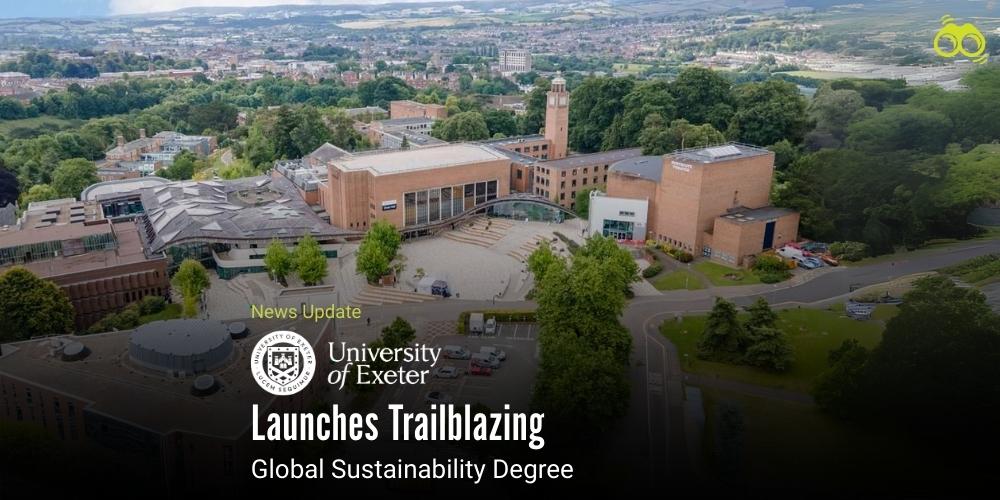University of Exeter’s Global Sustainability Degree: Preparing Students for a Sustainable Future
Revolutionary Degree at University of Exeter Combines Science, Humanities, and Sustainability
Exciting news awaits students passionate about making a positive impact on the planet. The University of Exeter’s Cornwall campus is set to launch a pioneering BA/BSc (Hons) in Global Sustainability in September 2026. This innovative degree is not just another academic programme; it’s a response to the urgent need for solutions to some of the world’s most pressing issues.
As climate change, resource depletion, and social inequalities continue to challenge our global community, this course offers an essential interdisciplinary approach to sustainability. By integrating natural sciences, social sciences, and the humanities, students will gain the comprehensive knowledge and practical skills necessary to address the complex environmental and societal problems of today and the future. This degree is designed to equip the next generation of leaders with the tools they need to create a more sustainable and just world for all.
What sets this programme apart is its solutions-focused framework, which encourages students to move beyond traditional academic boundaries. By drawing on expertise from departments across the Penryn campus—home to some of the UK’s leading experts in climate science, biodiversity, human health, and engineering—the degree is designed to equip graduates with both theoretical knowledge and practical skills to tackle complex environmental and social issues.
Unlike the traditional UK education model, which often urges students to narrow their focus from A Levels onwards, this programme embraces a broader academic approach. It allows students to explore a wide range of disciplines and grants genuine academic freedom to shape their learning paths, enabling them to focus on either science or humanities subjects, or maintain a balanced mix of both.
In the first year, students will undertake core modules in Geography, Environmental Science, Politics, and History to build a strong foundation in sustainability. In the second and third years, they will be able to tailor their studies according to their interests, ultimately graduating with either a Bachelor of Arts or Bachelor of Science, depending on their chosen focus. Furthermore, the programme includes field trips and opportunities to engage with businesses and organisations, offering valuable hands-on experience. This practical exposure is designed to strengthen students' ability to apply their learning in real-world contexts.
According to Professor Tom Currie, co-director of the programme from the Centre for Ecology and Conservation, today’s environmental and social challenges often don’t fit neatly within traditional academic fields. He stressed that addressing such complex issues requires a deep understanding of both ecological and human systems, highlighting the importance of interdisciplinary knowledge and skills.
Dr Wendy McMahon, co-lead of the degree and Senior Lecturer in History, emphasised that the programme is more than just a combination of subjects—it actively weaves them together to break down disciplinary barriers and foster meaningful collaboration with external partners. She added that the degree aims to keep career options wide open, preparing students for roles in business, politics, education, science, and media, all of which must work together to address future sustainability challenges. The BA/BSc (Hons) in Global Sustainability, launching in September 2026, reflects a transformative step towards a more holistic and integrated model of higher education. For students looking to make a real difference, this degree offers the ideal foundation for a sustainable future.
Editor's Note
The launch of the BA/BSc (Hons) in Global Sustainability at the University of Exeter’s Cornwall campus in 2026 marks a significant step towards equipping students with the knowledge and skills necessary to address some of the world’s most pressing challenges. By combining natural sciences, social sciences, and the humanities, this innovative course will provide a well-rounded education, encouraging students to think critically and collaboratively about sustainability. Throughout the programme, students will learn how to tackle complex environmental and social issues, gaining practical experience through field trips and industry engagement. The interdisciplinary approach ensures that graduates will be prepared for a range of careers, from business to politics, education, and media.
Skoobuzz emphasises that this degree is not just about academic learning—it’s about empowering the next generation to lead the way in creating a more sustainable and equitable future for all.














0 Comments (Please Login To Continue)